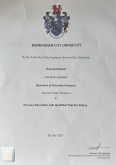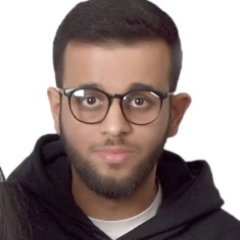Hasnaat N. - Tutor in Birmingham
| Subject | Age/level and price |
|---|---|
|
Preschool Age - £15 - 60min
Primary Age - £15 - 60min
KS1 - £15
KS2 - £15
Ages 1 - 4 - £15
Ages 5 - 7 - £15
Ages 8 - 11 - £15
Beginners - £15
Average - £15
|
|
|
Preschool Age - £15 - 60min
Primary Age - £15 - 60min
KS1 - £15
KS2 - £15
Ages 1 - 4 - £15
Ages 5 - 7 - £15
Ages 8 - 11 - £15
Beginners - £15
Average - £15
|
|
|
Preschool Age - £15 - 60min
Primary Age - £15 - 60min
KS1 - £15
KS2 - £15
Ages 1 - 4 - £15
Ages 5 - 7 - £15
Ages 8 - 11 - £15
Beginners - £15
Average - £15
|
| Institution | Town | Speciality | Degree | Class |
|---|---|---|---|---|
| Birmingham City University | Birmingham | Primary Education | Bachelor | 2:1 |

|
Every child deserves an adult who will never give up on them, who understands the power of connection and insists that they become the best that they can possibly be. I am currently a student of BA (Hons) in Primary Education with QTS at Birmingham City University. I am wanting to move into a NQT position to put the information and experience picked up from this course into practice. My long-term career ambition is to become the lead of a subject area or year group in KS1 or KS2; utilizing my knowledge and experience to positively impact the lives of the children and colleagues around me whilst being the best teacher I can be. During my GCSEs I completed some work experience in my local primary school. I worked with young children from the ages of five to seven. This experience encouraged me to build a variety of different skills and abilities. Realizing I had the ability to improve the learning of numerous young people was exceptionally fulfilling, which is the reason I have chosen to seek a profession in teaching. To be a teacher is to establish a solid, positive, and healthy learning environment where students are ready to learn. It is significant that the classroom is one in which courtesy, achievement, respect and compassion are stimulated. I want to have the opportunity to offer children the chance to learn in a way which will amplify their learning and improve their involvement in the classroom. I have great communication abilities which are fundamental in the classroom environment to guarantee information has been imparted to the children successfully. I recognize the significance of understanding that each student may require an alternate way to deal with learning. Through my own experiences through placement, I have had the option to adjust and tailor work to suit every child’s requirement, assisting them with conquering learning obstructions. With advice and experience during my placements, I had the chance to see how differentiated lessons and exercises benefited the lower and higher ability students and how to incorporate these techniques into my own practice. This gave me an understanding as to how kids adapt and learn in different ways. Subsequently, differentiation is crucial to ensure that students are all meeting their targets and objectives. I am a coordinated and prepared individual who holds a high standard of requirements and expectations for all young people, no matter their academic ability. As an educator I think testing and challenging children appropriately helps to satisfy their potential. It is significant for their academic achievement and a crucial perspective in thriving during their learning in school. During my degree, I have accomplished three placement practices in a wide breadth of different communities in and around Birmingham. One in KS1 (Year 1 working class Birmingham) and two in KS2 (Year 4 upper class Birmingham & Year 5 inner city Birmingham). Having my placements in three very different communities and areas have allowed me to adapt my skills when planning, teaching and assessing due to the schools being so different from one another. Throughout all these placements I have had the opportunity to plan and teach for my chosen age range, 5-11 as well as 3-7. I was extremely fortunate to have had this chance to see first-hand the contrasts between planning, training and teaching both age ranges. I have co-operated with fellow teachers in my school placements to design lesson plans, attended staff meetings and training workshops. I have learnt many aspects such as how to deploy teaching staff, differentiating lessons appropriately and assessment. My university modules on assessment, differentiation and inclusion informed me on the most proficient methods to use in my own lessons, to guarantee that the appropriate children are aided with the correct support. In my first teaching practice (year 1), I was placed in a class with a fellow student. This was an extremely positive experience for me as I had the chance to ‘team teach’ with her. This opportunity to allow us to critically analyse each other’s performances and presentations within the classroom. I learnt that sharing the learning outcomes and success criteria with the students, allowed them to analyse and track their own progress within the lesson. This allowed me to use my AFL strategies within the lesson, seeing which children were on the right path and which children were not. This informed my evaluations of the students and my planning for the following lessons, allowing me to appropriately differentiate. During my second teaching placement (year 4), I took in the significance of time keeping and planning lessons, to allow and guarantee young children are achieving and successful in the exercise. I took in the advice from my placement mentor and class teacher when planning my lessons in a way that allowed me to structure my lessons appropriately. I arranged how long each activity should be, to keep the children interested. After using this planning technique, I noticed a change in my lessons, the children were more focused and on task. This encouraged a sense of routine within the classroom, which positively affected the children’s achievement. In my final year placement (year 5), I had a major focus on differentiation and assessment. At the beginning of my practice, I sat down and spoke with my class teacher and discussed the appropriate ways in which I could differentiate appropriately in maths and English. I took this advice on board and implemented this in my own planning and activities. I took the advice of the subject leaders in maths and English on how to appropriately assess the children’s book work. By looking at their own books, I managed to gain a string understanding as to how I can challenge the pupils further and eventually close the gaps in their learning. I also assisted the class teacher and wrote some mini reports for parents evening, using my knowledge of assessment to inform this. |








